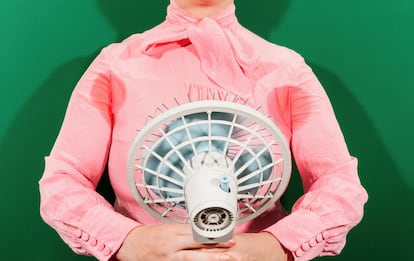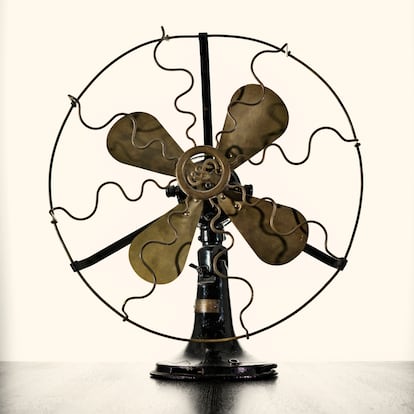How to survive summer in Spain: Air conditioning or fans?
As the thermometer starts to soar, EL PAÍS looks at the advantages and disadvantages of each device with respect to both environmental and health factors

Fans or air conditioning, that is the question – one that resurfaces every summer in Spain when thermometers soar and we can’t get away from the stifling heat.
The fan, of course, is the cheaper option but money isn’t everything – while you don’t want to be baking hot, you don’t want to pollute the planet either; nor do you want to worry about maintenance, or install an appliances that won’t work later; and, obviously, you don’t want to get sick. It’s a dilemma, but when making the choice, humidity is key.
The style factor
Whether anchored to the ceiling or resting on the floor, there is a fan to satisfy all tastes, though ceiling fans are by far the most popular. “It is a trend-setter and the one in most demand, not only because it is better at coping with the high summer temperatures but also because, little by little, it has become aesthetically integrated into the interior design of the home,” explains Montserrat Ramos, a product manager at the homewares company Leroy Merlin Spain.
Another advantage of the ceiling fan is that by simply changing the rotation direction of the blades, it can keep the house warm in winter as well. “The winter position takes the warm air from the upper part of the room and pushes it down. The summer position takes the cold air from the floor and lifts it upwards,” explains José Arboledas, an air quality expert from the General Council of Official Associations of Industrial Technical Engineers in Spain (COGITI).
Of course, neither ceiling fans nor any other type of fan can rival the power of an air conditioning unit, which can give us goose bumps within the space of a few minutes or heat the room to the temperature of our choosing. And while Ramos points out that the humble fan can reduce the thermal sensation by 5ºC, it doesn’t always succeed.

Recent research on the health impact of fans has been carried out by Ollie Jay, professor of Thermoregulatory Physiology at the University of Sydney in Australia. In one of his studies, he simulated a very dry heat wave and also a humid heat wave, and observed that it was only in humid heat that fans significantly reduced body temperature, regulated stress and improved heart rate and thermal comfort. In dry conditions, the effect was the opposite even when the temperature was lower – the fans exacerbated all these parameters and even increased the feeling of being stifled by the heat.

Tricking the fan
Although Ollie Jay used just 12 people in his study and more research is needed, the Australian expert recommends using these devices during the generally more humid heat waves common in the United States and Europe. “Only in cases where the temperature is very high and humidity levels are very low can fans be harmful,” Jay concludes. In other words, for a fan to realize its full potential, there must be some humidity in the atmosphere. Otherwise, it is counterproductive.
Colds, laryngitis, pharyngitis, bronchitis…
When the heat is too dry for a fan to work, air conditioning comes into its own. But you have to bear in mind it will dry out the environment even more, and could lead to health problems. Most of these derive from the irritating and inflammatory effect that cold produces in the upper airways – the pharynx and larynx – and even the bronchi.
“Air gets warmer when it enters the nostrils, so when it reaches the bronchi it is the same temperature as the body,” says Olaia Bronte, a member of the environment wing of the Spanish Association of Pulmonology and Thoracic Surgery. “When that air is too cold, it doesn’t have time to warm up in the nose. To counteract this dryness, people who spend a lot of time in air-conditioned areas should drink water often to keep their bodies adequately hydrated.”
Fortunately, these ailments are almost always mild. “The most serious problems are often caused by germs that accumulate in filters when they are not cleaned or maintained properly,” says Bronte. “Up to 20% of colds, laryngitis, pharyngitis and bronchial conditions that occur in the summer are due to improper use of air conditioning.”

She adds that these filters also tend to accumulate dust and other types of organic substances, which can lead to problems ranging from a simple cold to a potentially serious bacterial or fungal infection.
The fan can also be responsible for health problems, however, even if it does not have filters or complex maintenance systems – currently there are air purification and filtration systems based on ultraviolet light, photocatalytic and ionic filtration technology.
According to Paulino Pastor, general manager of the indoor air quality consultancy Ambisalud, “There is always a mixture of chemical and microbiological pollutants and solid or liquid particles [in the air].” The fan moves the dust and contaminating particles, and can trigger infection that is circulating at any given moment or cause respiratory problems over a period of time. As the COGITI expert, José Arboledas, points out: “It is advisable to leave the window open even just a crack while the fan is on so that the air is refreshed.” This is also good practice when you opt for air conditioning.
The environmental factor
Mar Fernández Nieto, an assistant doctor at the allergology department of the Jiménez Díaz Foundation’s University Hospital in Madrid, stresses that getting the temperature right with these cooling systems is not only a question of health but also an environmental issue. Air systems are subject to a regulation that specifies a minimum temperature of 26ºC, with a relative humidity of between 30% and 70% in administrative, commercial and public premises.

Changing filters
Fans meanwhile require far less energy – a 2 kW air conditioner can use 20 times more in one month than a 50 W fan. This means it’s less problematic to leave them on overnight, when getting the perfect temperature seems crucial – it’s worth remembering that they sell fans with a timer that will turn them off when we are likely to be asleep. “The noise produced by the blades chopping the air is relaxing and sleep inducing,” says Leroy Merlin product manager, Montserrat Ramos.
Optimum sleeping temperature
Joaquín Sastre, head of the allergology department at the Jiménez Díaz Foundation’s University Hospital in Madrid, says: “When we sleep, our body temperature always drops – due to inactivity – but normally the temperature of the device is adjusted to suit daily activity; this means that we get cold if we sleep with the air conditioning on. Another problem is that air conditioning reduces humidity due to the compression system used for cooling, and the resulting dry air is more irritating, especially if you snore or breathe through your mouth.”
Similarly, Fernández Nieto recommends opening a window instead of using these devices at night, stressing that the irritating action of cold air on the upper and lower airways can lead to voice loss and coughing. In people with asthma or chronic obstructive pulmonary disease (COPD), they can trigger an attack. “Another effect is that prolonged exposure to a cold, dry air stream can lead to muscle contractures,” he says. “As for ceiling fans, which are often used in bedrooms, despite the fact the air current is being mobilized rather than cooled, I would apply the same criteria as I would for air conditioning: better not to use them when sleeping.”
English version by Heather Galloway.
Tu suscripción se está usando en otro dispositivo
¿Quieres añadir otro usuario a tu suscripción?
Si continúas leyendo en este dispositivo, no se podrá leer en el otro.
FlechaTu suscripción se está usando en otro dispositivo y solo puedes acceder a EL PAÍS desde un dispositivo a la vez.
Si quieres compartir tu cuenta, cambia tu suscripción a la modalidad Premium, así podrás añadir otro usuario. Cada uno accederá con su propia cuenta de email, lo que os permitirá personalizar vuestra experiencia en EL PAÍS.
¿Tienes una suscripción de empresa? Accede aquí para contratar más cuentas.
En el caso de no saber quién está usando tu cuenta, te recomendamos cambiar tu contraseña aquí.
Si decides continuar compartiendo tu cuenta, este mensaje se mostrará en tu dispositivo y en el de la otra persona que está usando tu cuenta de forma indefinida, afectando a tu experiencia de lectura. Puedes consultar aquí los términos y condiciones de la suscripción digital.








































